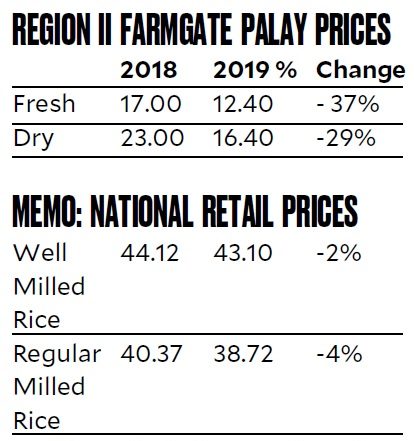Rice farmers in grave danger
At the recent Department of Agriculture budget review presented to the legislated public-private Philippine Council for Agriculture and Fisheries, it became evident that rice farmers are in grave danger. This is mainly due to the rice tariffication law, with a low 35 percent tariff on rice imports. Rice experts predicted that least 45 percent of rice farmers would not be able to survive this tariff. The prediction has come true.
The table below uses data for Region II rice farmers as well as retail prices nationwide for the first week of June as reported by the Philippine Statistics Authority.
Note that farm gate prices fell by 37 percent for fresh palay and 29 percent for dry palay. However, retail prices hardly moved, falling by 2 percent for well-milled rice and 4 percent for regular milled rice. More than 80 percent of rice farmers sell fresh palay while more than 80 percent of consumers buy well-milled rice. Therefore, the great majority shows a 37-percent decrease in farmgate and only 3-percent decrease in retail prices. If we reduce the farmer’s reported P30,000 average income per hectare of rice in 2018 by 37 percent, his income will go down to only P18,900 this year. This is grave danger.
It is the trader who is making profit at the expense of both the farmer and the consumer. A study on the suggested retail price (SRP) for rice in specific locations should be made to address this problem.
However, the emphasis, should be on helping the rice farmer survive. The low numbers cited here are the averages, which means that about half get below those numbers. Unfortunately, even with the proposed huge 2020 DA budget, the target is for the rice farmer to get a net income per hectare for 2020 of P28,703. This is less than his income in 2018. In the 2020 budget, there is no significant support for fertilizers and good seeds. These are two major components that our farmers lack, which also happen to be the critical factors in raising their productivity and incomes.
There has been a long-standing concern that the government largely uses a single commodity approach, instead of focusing on the farmer who should do other products. Thus, the coconut farmer can raise his income by intercropping a product like cacao in the 2 million hectares of coconut trees that have nothing in between them. His income can go from P20,000 per hectare to more than P80,000. The rice farmer can plant other products like vegetables and other crops. The rice plan should go beyond rice for the farmer but extend to other alternative income sources.
The 2020 budget should include the reorientation of 17,000 agriculture extension workers who have been devolved to local government units and are not equipped to help farmers. Farmer in dire straits should now qualify for cash transfers. They can use these transfers to purchase fertilizers, seeds and other inputs.
At the budget review, an Alyansa Agrikultura leader suggested that the 2020 DA budget become more strategic. It should fund the formulation of farmer and commodity roadmaps, and management systems to ensure effective implementation. Both are sorely lacking, with few well studied roadmaps and some of DA’s 27 organizational units having an ISO 9000 management system.
The 2020 budget should support a different kind of plan, and the priority should be to get our rice farmers out of the grave danger.
